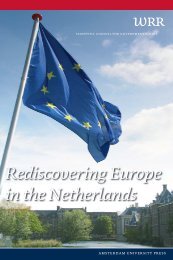The Western Condition - St Antony's College - University of Oxford
The Western Condition - St Antony's College - University of Oxford
The Western Condition - St Antony's College - University of Oxford
You also want an ePaper? Increase the reach of your titles
YUMPU automatically turns print PDFs into web optimized ePapers that Google loves.
Faces <strong>of</strong> the West: Can Europeanisation, Americanisation and Autonomisation be reconciled?<br />
European states and institutions to create a strictly secular and ‘western’ state and society, also<br />
because they realised that this was the only way to escape colonisation and domination. 159 <strong>The</strong><br />
logic <strong>of</strong> this ‘westernisation’ was a direct result <strong>of</strong> the hegemonic West, represented at that time<br />
by the European powers. For Turkey’s authoritarian modernisers, who subscribed wholesale to<br />
the dichotomous worldview associated with the European Enlightenment, the West symbolised<br />
modernity and civilisation, while the East stood for religion and tradition, also bywords for<br />
backwardness and ignorance. 160 Turkey’s western condition is an old affair.<br />
During the Cold War, Turkey found itself under the same ‘western’ security umbrella with those<br />
European countries that its founders had sought to emulate. Yet despite the geostrategic<br />
convergence, deepening economic ties, and the heightened level <strong>of</strong> cultural and societal exchange,<br />
its European engagement during this period was also marked by visible mutual distrust. Across<br />
Europe, a subtle but persistent antipathy towards Turkey, which was viewed widely (and not<br />
entirely inaccurately) as a corrupt, repressive and patriarchal state and society, was coupled by a<br />
popular (and <strong>of</strong>ten openly racist) dislike <strong>of</strong> the ‘uncivilised’ Turks now populating European<br />
cities, a trope that was ironically also shared by many elite cadres <strong>of</strong> the Kemalist establishment.<br />
Meanwhile, the mainstream Turkish discourse featured both a sense <strong>of</strong> jealousy and admiration<br />
for Europe’s cultural appeals and material prosperity and a feeling <strong>of</strong> anger and suspicion<br />
towards European policies and attitudes vis-à-vis Turkey.<br />
Historically-rooted socio-political tensions largely determined the cycles <strong>of</strong> Turkey’s engagement<br />
with Europe throughout and as well as right after the Cold War, such as its troubled relationship<br />
with Bulgaria and Greece over each other’s treatment <strong>of</strong> their religious minorities (and over<br />
Cyprus with Greece), 161 or strained ties with France for the latter’s suspected support for the<br />
Armenian terrorist organisation ASALA. 162 With the arrival <strong>of</strong> thousands <strong>of</strong> Kurdish political<br />
refugees in the 1980s across northern Europe, the Turkish state’s repressive policies and the<br />
plight <strong>of</strong> Turkey’s Kurds came under the spotlight in Europe and found critical audiences across<br />
the continent. Consequently, as Turkey’s US-equipped security forces engaged in a brutal<br />
campaign <strong>of</strong> suppression against the Kurds during the 1990s, Turkish <strong>of</strong>ficials repeatedly<br />
159 As is well known, the Kemalist idea <strong>of</strong> secularism corresponded to French laicite, which stood more for state<br />
control (and <strong>of</strong>ten suppression) <strong>of</strong> public expressions <strong>of</strong> religiosity than the separation <strong>of</strong> church and state, as in the<br />
Anglo-Saxon tradition. <strong>The</strong> young republic translated its penal code from that <strong>of</strong> Fascist Italy and its civil code from<br />
the Swiss. Ironically, the country that was designed to be a purely ‘European’ nation-state had become recently<br />
purged <strong>of</strong> many <strong>of</strong> its non-Muslim communities and consisted <strong>of</strong> an overwhelming majority <strong>of</strong> Muslims.<br />
Throughout the republican period, policies against non-Muslims further reduced their numbers.<br />
160 This dichotomy was regularly emphasised by Kemal Atatürk, the founder <strong>of</strong> modern Turkish republic. In a 1923<br />
interview, he stated that “Turks have followed only one destination over the centuries. We have always walked from<br />
the East towards the West. […] Our whole effort is to establish a modern, and therefore, western government in<br />
Turkey. What nation desires to enter civilisation but does not turn towards the West?” Nimet Arsan (ed) Atatürk’ün<br />
Söylev ve Demeçleri, Vol. 3 (Ankara: Türk Tarih Kurumu Basımevi, 1989), p. 91.<br />
161 Othon Anastasakis, Kerem Öktem, Kalypso Nicolaids (eds), In the long shadow <strong>of</strong> Europe: Greeks and Turks in the era<br />
<strong>of</strong> Post-Nationalism (Leiden: Brill, 2009).<br />
162 William Echikson, ‘Armenian bombing at Orly ends pact between Socialists and terrorists’, Christian Science<br />
Monitor, 19 July 1983.<br />
60

















